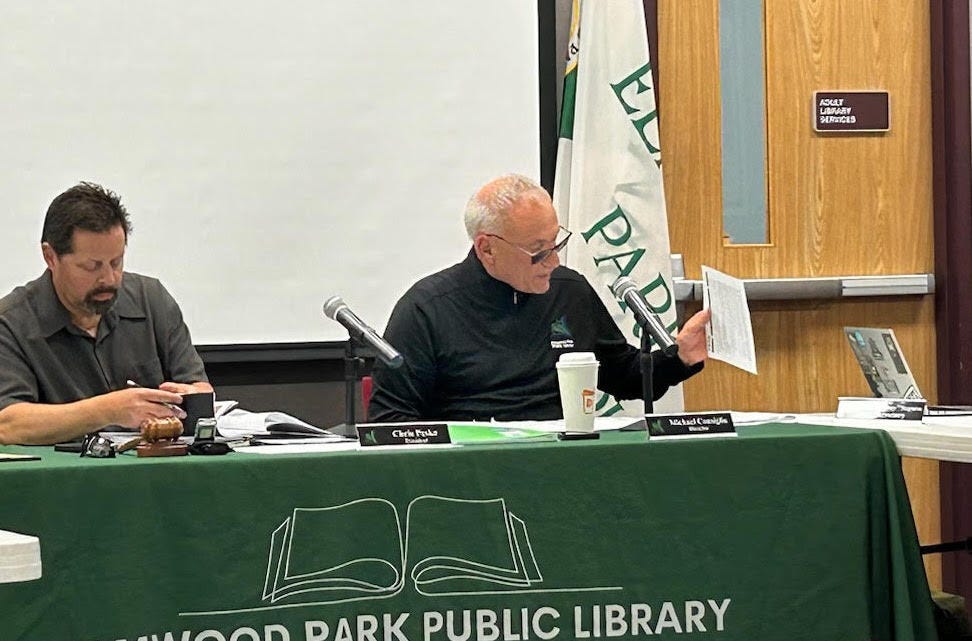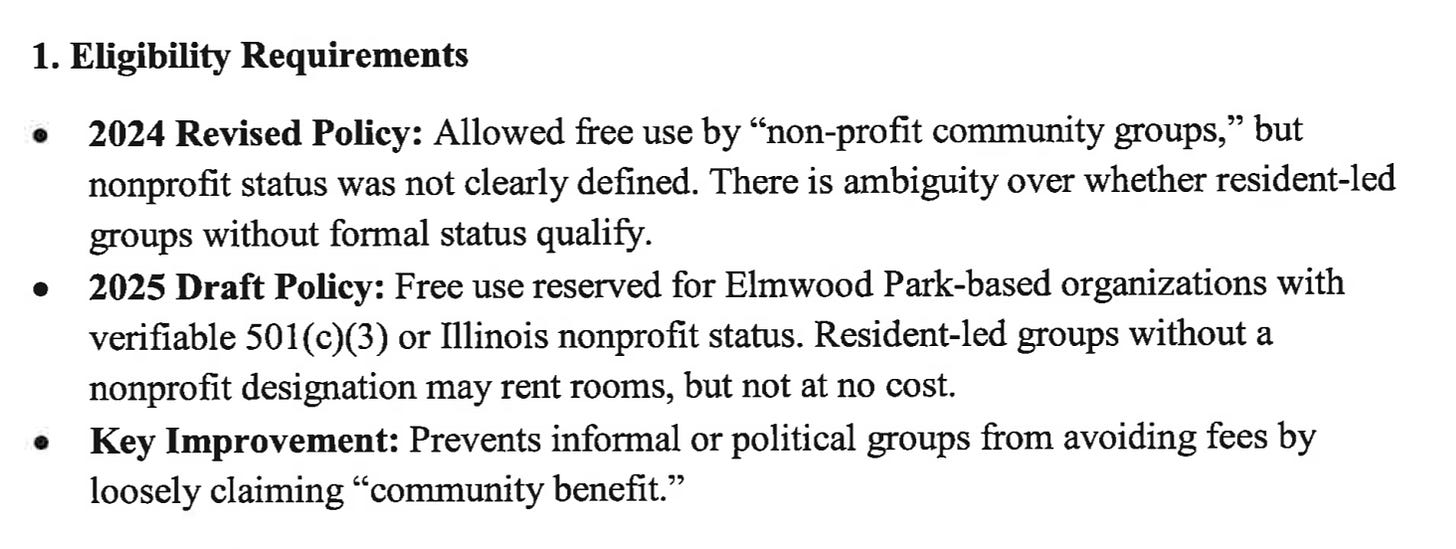Letter From The Editor: Library Director Gives The Newsletter An Offer We Couldn’t Refuse

By Kevin Gosztola, Editor-In-Chief
On October 2, the Elmwood Park Advocate received an email from Library Director Michael Consiglio that contained an offer to pay the $100 meeting room fee for this month’s “Community Conversation.” It immediately made me think of Don Corleone in “The Godfather,” when he says, “I’m going to make him an offer he can’t refuse.”
I did not think of the scene because of the violence behind this statement uttered by Corleone. Rather, I thought of it because I sense an intimidating coerciveness behind this offer: accept my personal generosity or else your newsletter will not be able to use the library’s main meeting room.
Also, if the Elmwood Park Advocate does not accept the offer, then the library director and library board president could paint us as difficult and unreasonable. But the truth is, no one involved or associated with the newsletter is responsible for the combination of developments, which have led to the library director insisting that the library must charge meeting room fees.
In July, upon information and belief, Library Board President Chris Pesko aligned himself with a group of seven or eight individuals in Elmwood Park who objected to “the process and rationale behind hosting [our] meetings at the library.” That was what Consiglio stated in an email sent to the newsletter on July 23.
Consiglio initially sought a legal opinion from the library’s paid attorneys at Klein, Thorpe & Jenkins that would clarify whether the meeting room policy required us to pay a fee. He said that he would share the attorney’s opinion when it was shared with him, but weeks later, there still was no legal opinion.
However, Consiglio moved on to drafting a meeting room policy that would give him greater authority to control the newsletter’s use of meeting room spaces and restrict the speech that we engaged in during “Community Conversations.”
The Elmwood Park Advocate reported on Consiglio’s plan to revise the meeting room policy. It sparked a backlash, and numerous residents wrote to the library director. For example, one resident declared, “As a long time Elmwood Park resident, I am concerned about the attempt by the library board to charge community groups a fee to use community rooms within the library. Isn’t the use of these rooms part of the tax dollars that I, and other residents, pay to Elmwood Park?”
Noting what we all recently observed with Jimmy Kimmel, this same resident emphasized, “Free speech is the bedrock of our democracy and politicians, village officials and other community leaders need to uphold it at every chance. That includes allowing community groups the right to use legitimate public facilities like library rooms free of charge and without recourse to what they may or may not say during their meetings.”
Several of the library director’s responses to residents were defensive. Astoundingly, he even appeared to deny that a proposal to change the meeting room policy had been put forward by him. “There is no plan to change the current approved policy,” Consiglio wrote to more than one resident.
After junking the meeting room policy proposal, the effort to control and infringe upon the newsletter’s free access to the meeting room shifted back to the library’s paid attorney issuing a legal opinion that the library director could wave at us when insisting the library must charge the newsletter a fee.
When notifying us about the legal opinion, Consiglio acted helpless and pretended that his hands are tied. The email made it seem like he is sorry, but he must charge the Elmwood Park Advocate to be “fair” and “neutral.”
But this entire ordeal has been fueled by Consiglio. The library director is acting in response to the anti-democratic wishes of a tiny anonymous faction within the village, which has repeatedly undermined the First Amendment rights of this community newsletter.
The Legal Opinion
What Klein, Thorpe & Jenkins apparently concluded is convoluted and confusing. According to Consiglio, they determined that “eligibility to meet is not the same as free use. The fee structure is separate and applies equally to all groups. Under the policy, only two types of organizations are exempt from paying fees.” Those exempt are Elmwood Park government agencies and Elmwood Park-based organizations that are 501c3 non-profit organizations.
In my view, Klein, Thorpe & Jenkins is not following a common rule of legal analysis that was acknowledged by their attorney Jim Ferolo during a library board committee meeting on September 8.
Ferolo said that a library should not “read other words” into a policy. A library is supposed to interpret what is on the page just as it would “interpret a statute and any law.”
So let’s all read what is on the page of this standard library meeting room policy:
The only fee listed for meeting room use applies to “for-profit organizations and non-Elmwood Park non-profit groups.” They are expected to pay $100/hour for meeting room use.
The policy does not spell out what not-for-profit community groups or resident library card holders should pay to use the room. Since the policy does not state a fee, a fair and impartial reading should be that such groups and residents are not required to pay any fee at all.
Numerous meeting room policies for nearby libraries list what requesters are supposed to pay if there are fees for meeting room use. Fees for not-for-profit community groups or resident library card holders are considerably lower than $100/hour or even free at several of these libraries.
That adds to the argument that if the Elmwood Park Public library director and library board wanted to charge community groups or residents they would have specifically defined this fee when revising the policy in February 2013, July 2015, July 2017, August 2020, and November 2024.
Furthermore, an analysis prepared for library board trustees, particularly those on the Bylaws, Goals, Policy, & Personnel (BGPP) Committee, contained the following:
To be clear, the library director openly conceded in this analysis that the policy does not require the library to charge a resident-led not-for-profit newsletter to use the library’s meeting room spaces. (That makes sense because the ambiguity was a key driver in Consiglio’s push for a new meeting room policy.)
Finally, the newsletter believes that it is not fair and neutral for the library director to pay meeting room fees that supposedly must be imposed for one group or resident and then expect another group or resident to pay the fee. Unless the library director is going to personally pay the fee for every reservation that does not come from a for-profit organization, the library director should simply waive all fees until the meeting room policy is updated by the library board.
What Next?
The library director approved the meeting room reservation for our next “Community Conversation” on Saturday, October 11 at 3 p.m. We plan to discuss feelings of indifference, mistrust, suspicion, or contempt that get in the way of community building in Elmwood Park. What causes this resentment, and how do we deal with hostility within ourselves and from fellow residents?
We will hold this gathering, and we invite everyone to invite their friends, family, coworkers, or neighbors to attend.
If the library director is really going to invoke the legal opinion from Klein, Thorpe & Jenkins and force community groups and residents to pay for the meeting rooms, then Consiglio should waive all fees for not-for-profit community groups and resident library card holders. Fees should be waived until the meeting room policy is updated.
Either way, Consiglio should work with library board trustees to update the meeting room policy so that it has a fee structure, like dozens of suburban libraries in Cook County, Illinois. The fee for not-for-profit community groups should be zero dollars. If the library director and trustees insist upon a fee, it should be lower than $25/hour. The fee for a resident library card holder should be free or no higher than $10/hour.
The Elmwood Park Advocate further requests that the library director apologize to the newsletter, its subscribers and readers, and all attendees of the “Community Conversations.” He should publicly promise to no longer engage in actions which undermine our First Amendment rights of association, assembly, speech, and to engage in freedom of the press.
As for library board trustees, we applaud Library Board Trustees Mike Monahan, Jesus “Chuy” Segura, and Pete Fosco for previously attending a “Community Conversation.” They saw for themselves what we are doing to create a space for dialogue in the village.
We urge all library board trustees to draft a new 2025 meeting room policy that deals with the vagueness and confusion that unintentionally exists, or was deliberately read into the policy over the past months. More importantly, we hope that trustees will strengthen the policy so that it will make it harder for future library directors to undermine the rights of residents going forward.
It has been a privilege to hold “Community Conversations” at the library over the past four months. Residents who attend leave with a sense of belonging and a feeling that they are more connected to their community. These meetings are clearly beneficial to Elmwood Park.
The Elmwood Park Advocate did not start this needlessly protracted dispute, but we can try to end it. Let us set whatever animosity exists aside once and for all.




That policy has been in place for years.
Just pay the fee or GO ELSEWHERE.
So just to clarify you last statement said you were able to hold a meeting but now you are going to be charged correct?
I still believe that this conversation being so important to you your readers. relocating to say the one of the community churches would still allow to get the message out and work on litigating this.
Hopefully your next outreach helps you guys out as a group.
I will maybe be able to make one of these some month but as of now time is just not free for me to come in for a discussion. I do hope some others do attend to bring the point of view of long time residents with views opposite to the general narrative seen in most articles. I would call it extremely liberal but those lines are so blurred these days it is hard to say..
I know I have at times been a agitation. Points of views from a different angle can be. But I am glad you all have been open to back and forth. I hope to see more folks return to a moderate view point no mDer their liberal or conservative beliefs, and maybe we as a whole can actually work towards change.